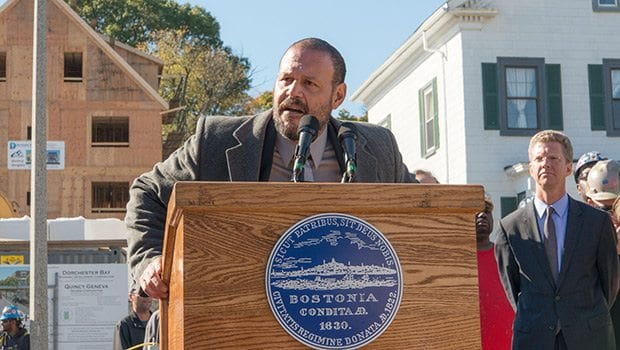
Over a few short blocks of Quincy St. in Dorchester, beginning on Blue Hill Ave. and heading east to Columbia Rd., a push to revitalize the area is on full display with four major projects spread out on both sides of the street and close to $100 million designated for investment.
At the heart of the work is the Quincy Heights project, which will rehabilitate nine former public housing buildings and construct two new buildings to create new affordable housing units in two phases. The proposal is for 80 new affordable housing units in the first phase and 49 new affordable housing units in the second phase. The $56 million budget of the project includes $3 million for increased social services in the surrounding community and $3 million for community developments around Quincy Heights.
The project is a culmination of six years of work by Dorchester Bay Economic Development Corp., Quincy Geneva Development Corp., United Housing Management, Dudley Street Neighborhood Initiative and Project RIGHT. Construction on the development started this summer and is expected to finish in December 2014.
Dorchester Bay EDC is also taking the lead on another development project on Quincy St. — the $14.5 million Pearl Small Business Food Production Center, which will help startups and small food businesses get off the ground. CropCircle Kitchen Inc. is leading the renovation of the 36,000-square-foot single story building, which was once home to the Pearl Meat Factory, into a shared, multi-tenant food production facility.
According to J.D. Kemp, founder and executive director of CropCircle Kitchen, the goals of the food production center will be to create 150 permanent jobs, promote entrepreneurship and small business development, build the infrastructure to support local food systems and improve access to locally produced, healthy food for low-income families.
Renovation work on the center is now underway and it is scheduled to be completed in April 2014.
There are two other projects that are contributing to the revitalization of what is being called the “Quincy Street Corridor.”
The first is the $20 million new construction of 44 homes for seniors with ground floor retail space right on the corner of Quincy St. and Blue Hill Avenue.
The second is $4 million redevelopment of a 20,000-square-foot auto repair shop at 259 Quincy St. into a digital design, education and fabrication training and industrial arts facility. The project is being called “259Q — The Dream Factory” and is being done in collaboration with Dorchester Bay EDC, Fablabs4America and Urban Idea Lab.
“This is like a ‘wow’ change,” said Jean DuBois, executive director of Dorchester Bay EDC. “We have never done so much in one place. To have three projects in three blocks is huge. And then to have two of those be job centers for the local people — we thought we might put housing over a community space here and the people said, ‘No, no, no we need jobs.’ And they meant it and we are going to have 150 jobs here.”
According to DuBois, Dorchester Bay EDC’s efforts along Quincy Street fit perfectly into the organization’s strategy of developing housing and commercial projects with the help and cooperation of community residents and partners.
“If you organize enough people and money you can do all this stuff. And a lot of this is partnerships, collaborations, but also the residents themselves. And that is where the spirit and soul of the neighborhood is and there are a lot of smart people at every block and if you get them together they will do good things. That is where the organizing comes in. If you don’t do that you are just building buildings. And doing things for people isn’t as good as people learning to fight for themselves.”
A large boost to the Quincy Heights project was the awarding of a $20.5 million U.S. Department of Housing and Urban Development grant in September 2011. Through the project, Boston is one of only five cities in the country to receive a HUD Choice Neighborhoods grant, which is targeted to re-develop distressed housing with affordable housing.
On Oct. 24, Mayor Thomas Menino, HUD Secretary Shaun Donovan and Massachusetts Department of Housing and Community Development Undersecretary Aaron Gornstein visited the site of Pearl Small Business Food Production Center to recognize the efforts along Quincy Street.
“Today marks the start of a new era for your neighborhood,” Menino said. “This is a rare opportunity. In these tough financial times there are not many $20 million grants out there. And I am going to personally hold people’s feet to the fire on this.”
HUD’s Donovan said a key to the success of the Quincy Street development so far and the awarding of the Choice Neighborhoods grant was the strong vision for the neighborhood that all the development partners have. He pointed out that Boston was the first city in the country to start work on a project with its grant.
“When we looked around the country to give one of our first five Choice Neighborhoods awards we looked for places that had a vision and a partnership just like is represented here,” Donovan said. “That’s what we were looking for and, boy, did we get it right. You do have the best neighborhood transformation effort in the country and we want to replicate it all over this country.”
Mass Housing’s Gornstein praised the Quincy Street development for tying together affordable housing with good schools and with economic development.
“This project demonstrates that we can undertake revitalization to the benefit of the current residents, as well as the future residents of this neighborhood,” said Gornstein. “So preservation of affordable housing and avoiding resident displacement is the key to the success of Choice Neighborhoods in Boston. I think it should be a lesson for other communities around the country – you can revitalize neighborhoods to the benefit of the current residents.”






